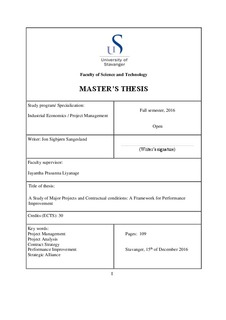| dc.description.abstract | The oil price has experienced a significant decline since the second half of 2014. In combination with the high cost level, many field developments in the Norwegian petroleum sector entail marginable profit. As a counter measure to cope with the challenging market conditions, both oil companies and service suppliers are making various efforts such as substantial downsizing internal staff, as well as reducing costs in all phases of the project. Moreover, major players have increasingly explored the possibilities that lie in collaborative and mutually beneficial relationships. As the market condition and oil price are expected to remain volatile, oil- and service supplier companies are now searching for strengthened competitive positioning through contractual innovation that can drive and sustain performance and efficiency. Gaining stability and control over cost development in projects is crucial for staying competitive in the business.
The thesis studies a few major development projects across two industry sectors, evaluating various options for strengthening the competitive positioning for oil- and supplier companies, and ultimately presenting a framework for performance improvement.
The study of projects points out common pitfalls and highlight important lessons from the projects. Key lessons are addressed to project planning, contract strategy, compliance of Norwegian requirements and the interaction between operator and contractor organization. On the basis of study findings and current market conditions, three options for strengthening the competitive positioning for Norwegian players are evaluated. (1) Formation of strategic alliance, (2) Risk-gain sharing agreements and performance based contracting and (3) Waste reduction to go ‘lean’. The study suggests option (2) and (3) can be more facilitated in the environment of a strategic alliance. Therefore, the thesis presents a framework for performance improvement, focusing on the benefits and challenges, values and risks associated with the formation of a strategic alliance. The thesis argues that with the modern market conditions, alliances are a viable option that can entail benefits such as strengthened & shared capabilities, stimulation of innovative technology development, and integrated capacity that supports growth for effectivity & efficiency. The study also revealed common challenges and pit falls such as cultural gaps, integration failure and worker resistance. However, if done right, the framework suggest the collaboration model can unlock significant value and mutual benefits for the partners, an approach more suited for addressing the financial and competitive challenges arising in today’s oil and gas industry with low- oil price and margins.
It is suggested that the challenges associated with strategic alliances can be alleviated by introducing industrial clusters devoted for strategic alliances. Removing the regional boundaries traditionally observed in clusters, and introducing real-time communication between strategic alliances on a global level can provide growth for better experience flow, opportunities to improve and more successful alliance relationships. A suggestion for future study is connecting with companies within a strategic alliance in order to access contract details so that a further specified framework can be developed. | nb_NO |

